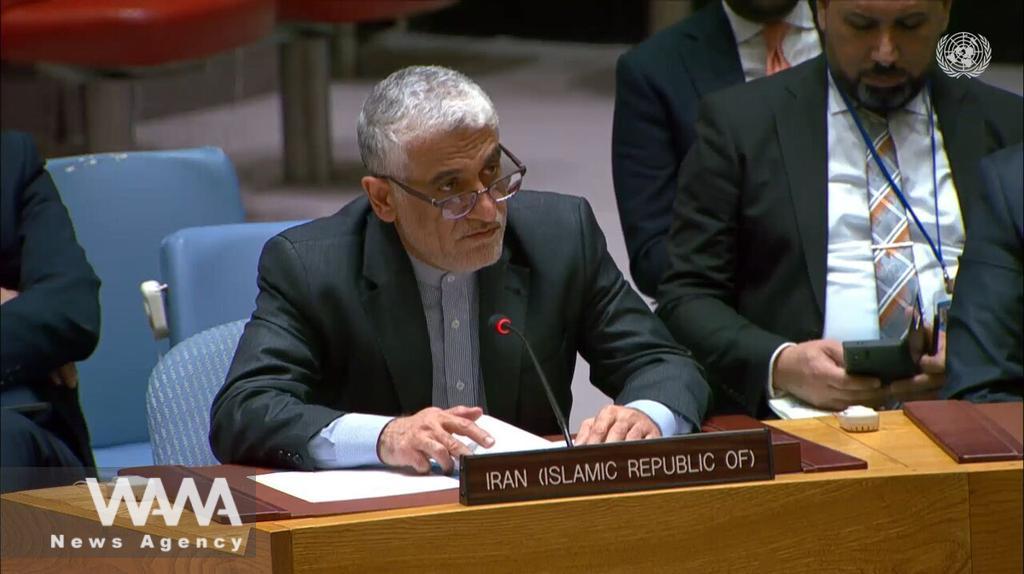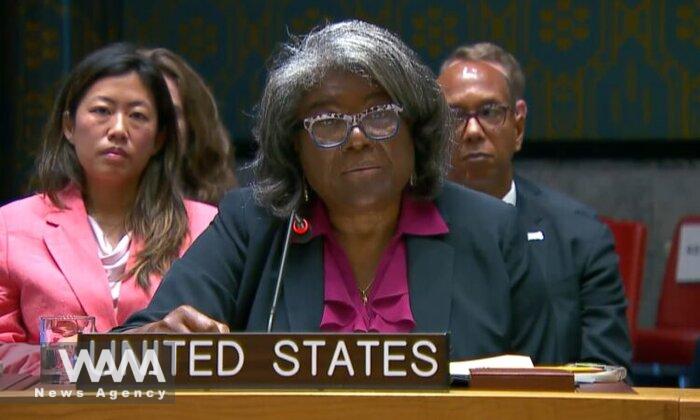Emergency Meeting of the Security Council: International Condemnation of Israeli Attacks on Iran
WANA (Oct 29) – Following Israel’s airstrikes on various regions in Iran, including Khuzestan, Ilam, and areas surrounding Tehran, the United Nations Security Council convened an emergency session at Iran’s request, with support from Algeria, Russia, and China. The strikes, which took place on Saturday, October 26, 2024, resulted in the death of four Iranian military officers.
Iran’s Foreign Minister, Seyed Abbas Araghchi, condemned the attacks in a letter to the UN Secretary-General, urging the international community to address Israel’s actions.
In his letter, Araghchi stressed the need for an international response, calling on the Security Council to take a firm stance against Israel’s “blatant violation of international law” and warned that Iran reserves the right to respond.

Amir Saeid Iravani, Ambassador and Permanent Representative of the Islamic Republic of Iran to the United Nations. Social Media / WANA News Agency
UN and Security Council Members’ Reactions
Khaled Khiari, Assistant Secretary-General of the United Nations, remarked in the meeting: “The exchange of attacks between Israel and Iran is pushing the region toward uncharted territory, requiring immediate de-escalation.” He reiterated the Secretary-General’s condemnation of escalating tensions, urging both parties to exercise restraint and return to diplomacy.
Member States’ Positions
Algeria
Algeria’s representative to the UN, Ammar Benjamaa, described Israel’s attacks on Iran as a violation of international peace and emphasized the need to respect UN principles and international law. He added that the international community must prevent Israel’s provocative actions.
China
Fu Cong, China’s representative to the UN, also expressed concern over the situation in the Middle East and Israel’s actions, calling for calm in the region. He emphasized that the Security Council should take immediate measures to prevent a worsening crisis.
United States
U.S. representative Linda Thomas-Greenfield expressed support for Israel, stating that Israel acted in “self-defense” and claiming that the U.S. had no involvement in the operation. She emphasized that Iran should refrain from any military response, describing Israel’s actions as aimed at “mitigating the Iranian threat.”

U.S. representative Linda Thomas-Greenfield
Russia
Russia’s representative, Vassily Nebenzia, warned of the serious consequences these attacks could have for the region, stressing that Security Council members must act to prevent the region from descending into war. Nebenzia also called on Israel to cease its provocative actions.
United Kingdom and France
Barbara Woodward, the UK representative, aligned with the U.S. position, urging Iran not to respond to Israel’s attacks and called for restraint from all parties.
Nicolas de Rivière, France’s representative, emphasized the need for a ceasefire in Gaza and for Israel’s security, urging the Security Council to take necessary steps to prevent further escalation.
Syria
Qusai Al-Dahhak, Syria’s Ambassador and Permanent Representative to the United Nations, stated, “The Israeli regime’s aerial aggression against Iran is a blatant violation of international law, the UN Charter, and Iran’s sovereignty and territorial integrity. This attack emphasizes that the regime is attempting to drag the region into a large-scale war.”
Iraq
The Iraqi representative at the UN Security Council meeting also said, “Iraq condemns Israel’s actions. The Iraqi government will pursue its complaint through international institutions.” He added, “We will not allow Iraqi airspace to be used for attacks on other countries. Israel’s action was a violation of Iraq’s sovereignty. Iran is our friend.”
Iran
Iran’s Ambassador and Permanent Representative to the United Nations stated, “The United States’ unconditional support for the Israeli regime, along with its obstruction of the Security Council’s duties as a permanent member, has emboldened Israel to continue its crimes and aggressions in Gaza, Lebanon, and now against Iran, seriously undermining regional peace and security.”
The Iranian ambassador emphasized, “The Islamic Republic of Iran has consistently pursued diplomacy as a means to resolve regional challenges and strengthen peace and stability. However, as a sovereign country, Iran reserves its inherent right to respond at an appropriate time to this act of aggression, as affirmed under Article 51 of the UN Charter. Our response will be lawful and fully in line with international law.”

Iravani: Our Response Will Be in Accordance with International Law
WANA (Oct 29) – Amir Saeid Iravani, Iran’s Ambassador and Permanent Representative to the United Nations, stated that the United States’ unconditional support for Israel, combined with its obstruction of the Security Council’s duties as a permanent member, has emboldened Israel to continue its crimes and aggressions in Gaza and Lebanon, and now against Iran. […]
Israel’s Allegations Defending Its Aggressions and Terrorist Actions
Danny Danon, Israel’s Ambassador to the United Nations, in the emergency Security Council session, defended Tel Aviv’s aggression against the Islamic Republic of Iran, claiming, “Israel’s enemies now understand that our promises are not empty. Iran chose to attack Israel to destabilize the region and create chaos.”
The ambassador asserted, “No sovereign country would tolerate hundreds of ballistic missiles aimed at its civilian population. No responsible government would allow its people to remain under constant threat.”
Repeating anti-Iranian allegations, the Israeli ambassador claimed, “Iran seeks to dominate the region and beyond.” He called for “immediate and crippling sanctions against Iran’s military and economic infrastructure.”
This emergency Security Council meeting highlighted the international community’s ongoing challenges in maintaining regional peace and security. With widespread condemnation of Israel’s actions from countries such as China, Russia, Algeria, and others, calls to prevent further escalation were strongly voiced.
At the same time, the U.S. and certain Western nations’ support for Israel’s right to self-defense underscored the deep divisions in addressing this crisis.
This situation places the Security Council in a significant test to determine whether it can find an effective solution amid conflicting demands and political pressures.













